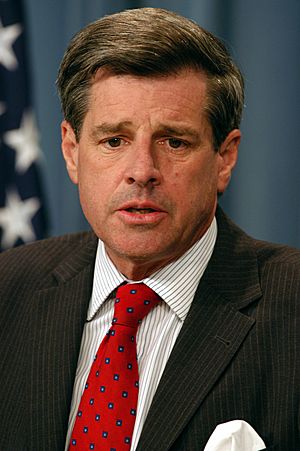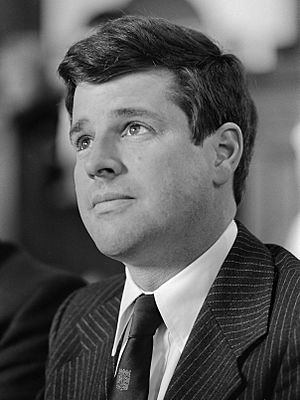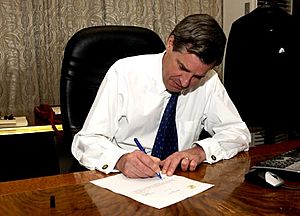Paul Bremer facts for kids
Quick facts for kids
Paul Bremer
|
|
|---|---|

Bremer in 2003
|
|
| Administrator of the Coalition Provisional Authority of Iraq | |
| In office May 12, 2003 – June 28, 2004 |
|
| President | George W. Bush |
| Deputy | Richard Jones |
| President of the IGC |
|
| Preceded by | Jay Garner (as Director of the Office for Reconstruction and Humanitarian Assistance) |
| Succeeded by | Ghazi Mashal Ajil al-Yawer (as Interim President of Iraq) |
| 6th Coordinator for Counterterrorism | |
| In office October 17, 1986 – May 25, 1989 |
|
| President | Ronald Reagan |
| Preceded by | Robert B. Oakley |
| Succeeded by | Morris Busby |
| United States Ambassador to the Netherlands | |
| In office August 31, 1983 – August 25, 1986 |
|
| President | Ronald Reagan |
| Preceded by | William J. Dyess |
| Succeeded by | John S. R. Shad |
| 9th Executive Secretary of the United States Department of State | |
| In office February 2, 1981 – March 27, 1983 |
|
| President | Ronald Reagan |
| Preceded by | Peter Tarnoff |
| Succeeded by | Charles Hill |
| Personal details | |
| Born |
Lewis Paul Bremer III
September 30, 1941 Hartford, Connecticut, U.S. |
| Political party | Republican |
| Spouse | |
| Children | 2 |
| Education | |
Lewis Paul Bremer III (born September 30, 1941) is a retired American diplomat. He was the second de facto head of state of Iraq as leader of the Coalition Provisional Authority (CPA) following the 2003 invasion of Iraq by the United States, from May 2003 until June 2004.
Contents
Early life and education
Born on September 30, 1941, in Hartford, Connecticut, Bremer was educated at New Canaan Country School, Kent School, and Phillips Academy Andover. Bremer's father was president of the Christian Dior Perfumes Corporation in New York and his mother was a lecturer in art history at the University of Bridgeport.
Bremer graduated from Yale University in 1963 and went on to earn an MBA from Harvard University in 1966. He later continued his education at the Institut d'études politiques de Paris, where he earned a Certificate of Political Studies (CEP).
Early career
Foreign Service
That same year he joined the Foreign Service, which sent him first to Kabul, Afghanistan, as a general services officer. He was assigned to Blantyre, Malawi, as economic and commercial officer from 1968 to 1971.
During the 1970s, Bremer held various domestic posts with the U.S. State Department, including posts as an assistant to Henry Kissinger from 1972 to 1976. He accompanied Kissinger on shuttle diplomacy missions to Israel, Syria, and Egypt to resolve the Yom Kippur War in 1973. He was Deputy Chief of Mission in Oslo, Norway, from 1976 to 1979, returning to the United States to take a post of deputy executive secretary of the Department of State, where he remained from 1979 until 1981. In 1981, he was promoted to executive secretary and special assistant to Alexander Haig.
Ronald Reagan appointed Bremer as ambassador to the Netherlands in 1983 and ambassador-at-large for counterterrorism and coordinator for counterterrorism in 1986.
Private sector
Bremer retired from the Foreign Service in 1989 and became managing director at Kissinger and Associates, a worldwide consulting firm founded by Henry Kissinger. A career member of the Senior Foreign Service, class of career minister, Bremer received the State Department Superior Honor Award, two Presidential Meritorious Service Awards, and the Distinguished Honor Award from the Secretary of State. Before rejoining government in 2003, he was chairman and CEO of Marsh Crisis Consulting, a risk and insurance services firm which is a subsidiary of Marsh & McLennan Companies.
He also served as a trustee on the Economic Club of New York, and a board member of Air Products and Chemicals, Inc., Akzo Nobel NV, the Harvard Business School Club of New York and the Netherland-America Foundation. He served on the International Advisory Boards of Komatsu Corporation and Chugai Pharmaceuticals.
Bremer and 1,700 of the employees of Marsh & McLennan had offices in the World Trade Center. Bremer's office was in the North Tower. In an interview with CNN after the September 11 attacks, he stated that their office was located "above where the second aircraft hit." On September 11, he was interviewed in Washington on WRC-TV at 12:30 pm in-studio.
Bremer and his wife were the founders of the Lincoln/Douglass Scholarship Foundation, a Washington-based nonprofit that provides high school scholarships to inner-city youths.
National Commission on Terrorism
Bremer was appointed chairman of the National Commission on Terrorism by House Speaker Dennis Hastert in 1999. The report, "Countering The Changing Threat of International Terrorism", was published in June 2000. He also served on the National Academy of Sciences' Committee on Science and Technology for Countering Terrorism, which authored a 2002 report called "Making the Nation Safer: The Role of Science and Technology in Countering Terrorism."
Provisional coalition administrator of Iraq
Bremer was appointed by President George W. Bush as presidential envoy to Iraq on May 9, 2003. His appointment declared him subject to the "authority, direction and control" of Secretary of Defense Donald Rumsfeld.
Bremer arrived in Iraq in May 2003. On May 11 he replaced Lt. General Jay Garner as Director of the Office for Reconstruction and Humanitarian Assistance. In June, the Office was transformed into the Coalition Provisional Authority, and Bremer became the country's chief executive authority. As the holder of the "most powerful foreign post held by any American since Gen. Douglas MacArthur in Japan," he compared himself to MacArthur as well as General Lucius Clay, who was in charge of the American zone in Germany following its defeat in World War II.
As the top civilian administrator of the Coalition Provisional Authority, Bremer was permitted to rule by decree. Among his first and most notable decrees were Coalition Provisional Authority Order 1, which banned the Ba'ath party in all forms and Coalition Provisional Authority Order 2, which dismantled the Iraqi Army.
On July 13, 2003, Bremer approved the creation of an Iraqi Interim Governing Council with the stated mission of "ensuring that the Iraqi people's interests are represented." The council members were chosen by Bremer from among groups and individuals which had supported the American invasion of Iraq. Bremer retained veto power over the council's proposals. The council was authorized to select a limited number of delegates to key Coalition Provisional Authority committees, like the Program Review Board.
Bremer also empowered the CPA to develop and implement the Iraqi constitution. The constitution became controversial when the first draft submitted by the CPA suggested banning political parties opposed to the U.S. occupation from participating in elections; privatizing much of Iraq's industries and natural resources; and allowing the unelected Iraqi Interim Governing Council to sign a binding Status of Forces Agreement between Iraq and the United States. On March 1, 2004, after several hours of negotiations, the Iraqi Interim Governing Council resolved the council members' disagreements with clauses in the constitution. A formal signing ceremony was scheduled for March 5, 2004. As the guests waited and the orchestra played, the signing was canceled due to mass demonstrations. Finally, on March 8, 2004, an interim constitution was signed. It was to be revised or replaced by a second constitution after Iraqi elections.
On June 28, 2004, at 10:26 am local time, the U.S.-led Coalition Provisional Authority formally transferred limited sovereignty of Iraqi territory to the Iraqi Interim Government, two days ahead of schedule. Bremer departed from the country on the same day. In his farewell speech, broadcast on Iraqi television, he said, "I leave Iraq gladdened by what has been accomplished and confident that your future is full of hope. A piece of my heart will always remain here in the beautiful land between the two rivers, with its fertile valleys, its majestic mountains and its wonderful people".
Bremer's office was a division of the U.S. Department of Defense, and as administrator he reported directly to the United States Secretary of Defense and the President of the United States. His senior adviser Dan Senor served as coalition spokesman, working with military spokesman Mark Kimmitt.
Bremer's role as the head of the CPA is notable for being the subject of much criticism. Large sums of money were reported to have gone missing under Bremer's leadership. Bremer's attempts at privatizing much of Iraq's infrastructure and mineral wealth were also highly criticized and the decision, apparently formulated in the office of the Secretary of Defense, to disband the Iraqi Army is widely blamed for fueling the Iraqi insurgency against the American occupation.
John Negroponte replaced Bremer as the highest-ranking American civilian in Iraq.
Post-Iraq career
After his return from Iraq, Bremer engaged in a few speaking tours. On December 14, 2004, Bremer was awarded the Presidential Medal of Freedom by President Bush, America's highest civil award for "especially meritorious contributions to the security or national interests of the United States, to world peace, or to cultural or other significant public or private endeavors." "He was also presented with the Department of Defense award for Distinguished Public Service and the Nixon Library honored him with the "Victory of Freedom Award" for "demonstrating leadership and working towards peace and freedom".
Bremer's April 18, 2005, visit to Clark University as a guest speaker led to protests against his role in the Iraq War. Dissatisfied with Bremer's speech and answers, several students also voiced disappointment at the university for having paid him $40,000. Another appearance, scheduled for the public library of his hometown, New Canaan, Connecticut, on January 18, 2006, was moved to the private St. Luke's School in the same town for fear for protests. During a February 27, 2006 public appearance at Lynchburg College, where his sister-in-law is an assistant dean, Bremer insisted that his decision to disband the Iraqi Armed Forces was the correct one.
Among other things, Bremer repeatedly asserted that when he came to Iraq, the Iraqi army had abandoned its barracks, and therefore "there was no army to disband". He also repeatedly defended his decision to expel Ba'ath Party members from government posts by comparing Saddam Hussein to Adolf Hitler.
On February 6, 2007, Bremer appeared before a congressional committee investigating fraud and abuse and was questioned about missing funds during his tenure as head of the CPA and a January 2005 audit that found $8.8 billion in unaccounted for funds.
Memoir
In 2006, Bremer published a memoir called My Year in Iraq: The Struggle to Build a Future of Hope, which was described as "an almost day-by-day narrative that sticks to what Bremer was doing and with whom he was interacting, without providing much analysis or introspection." Michiko Kakutani of The New York Times characterized it as "an amalgam of spin and sincerity, is partly an explanation (or rationalization) of actions Mr. Bremer took as America's man in Baghdad, partly an effort to issue some 'I told you so's' to administration colleagues, and partly an attempt to spread (or reassign) responsibility (or blame) by tracing just who in the White House, Pentagon and State Department signed off on or ordered critical decisions made during his tenure".
His media commentary is generally critical of the Obama administration for not devoting more effort to promoting democracy overseas. He is also a consistent advocate for continued U.S. presence in Iraq. On the other hand, while many other conservatives began advocating for a withdrawal from Afghanistan, Bremer endorsed the administration's new strategy in 2010, describing it as "reasonable" and giving Obama "credit for deciding to replicate President Bush's Iraq strategy by sending more troops to the fight in Afghanistan". He has also endorsed Samuel P. Huntington's "clash of civilizations" thesis, stating: "It is a fact of history that Europe is based on Judeo-Christian values. But Europe seems unwilling, or perhaps afraid, to acknowledge this reality."
Painting and writing
After taking art lessons at a school in Glen Echo, Maryland, in 2007, Bremer began doing oil paintings of New England country landscapes, which he sells through his company Bremer Enterprises. What he sells proceeds to the historical societies of Chester and Grafton in Vermont, where he moved after his public retirement. He has self-mockingly described his style of painting as "evolving American primitive".
The Bremer Enterprises website also provides links to books by Bremer and his wife Frances Winfield Bremer. In addition to his 2006 memoir, in September 2011 Bremer published From Sea to Shining Sea: Biking Across America with Wounded Warriors, on Amazon.com's Kindle platform via Bremer Enterprises.
Ski instructor
During his time in Afghanistan, he set up the country's first ski run in the mountains outside Kabul. Bremer has worked for several seasons as a ski instructor at Okemo Mountain Resort in Vermont.
Board activities
He also engages in consulting work and serves on a number of boards. Bremer currently serves on the board of directors of BlastGard International, a Florida-based company that manufactures materials to mitigate the impact of explosions.
In November 2010, Bremer joined World T.E.A.M. Sports, a Holbrook, New York-based nonprofit, as CEO and President. Bremer also served as a member of the organization's board of directors. He retired from the organization in March 2012 and as of 2015 was listed as a 'Special Advisor'.
Bremer formerly served as a member of the board of directors of the International Republican Institute.
He received the America Award of the Italy-USA Foundation in 2013.
Internet meme
Bremer appears in a viral internet meme, where his phrase "Ladies and gentlemen, we got him" following the capture of Saddam Hussein is used to accompany someone getting 'busted' or exposed, often with Breakbot's "Baby I'm Yours" playing in the background. After his granddaughter informed him of the trend, he was fascinated by it and hoped it would increase people's interest in Iraq's recent events.
See also
 In Spanish: Paul Bremer para niños
In Spanish: Paul Bremer para niños



